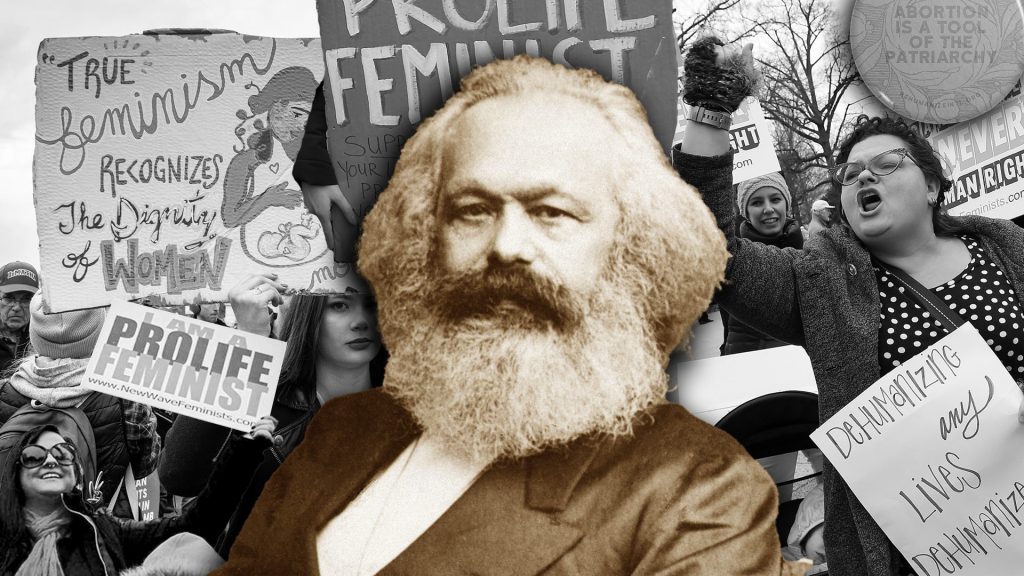*Audio edit: Lila Rose is the President of Live Action, not Action for Life
What does it take to be pro-life? Well, for one you must be a feminist; or, at the very least, uphold key feminist doctrines. If you think that’s sensationalized hyperbole, consider the following quotes from some of the most influential leaders and organizations within the Pro-Life Movement:
Why should feminists oppose abortion? Perhaps the phrase “opposes abortion” in the statement above came as a surprise to many. Considering how central this tenet is to the current idea of feminism, how could one ever be feminist AND pro-life? We will begin with the history of the feminist movement and the feminist philosophy in order to explain that not only can you be both, but you should be both.” – Rehumanize International
Authentic feminism is pro-life….Women are at the forefront of historic life-affirming change in state legislatures and in Washington, shaping conversations everywhere about how we care for children and support families, and will continue to lead America into this new era for life.” – Marjorie Dannenfelser, President of Susan B. Anthony Pro-Life America
Being Pro-Life is the ultimate act of feminism.” – Vitae Foundation
Real feminism is pro-life.” – Lila Rose, President of Live Action
You cannot celebrate #InternationalWomensDay if you also promote violence against women and pre-born children. #Abortion betrays #women and is the antithesis of feminism, it’s the ultimate misogyny.” – Bryan Kemper, Director of Priest for Life
The founders of the feminist movement recognized abortion for what it is – oppressive, violent, & anti-woman. Men, who wanted to be able to recklessly sleep with women and not face the possibility of fatherhood, are the ones who distorted that view and clouded the truth.” – Students for Life of America
As long as I can remember, I’ve called myself a feminist.…I’m also pro-life….Family leave and child care access are areas where the feminist and pro-life agendas perfectly intersect: Better policies are good for women, and could help reduce the perceived need for abortion.” – Claire Swinarski, pro-life writer
…abortion is a reflection that our society has failed to meet the needs of women. We are dedicated to systematically eliminating the root causes that drive women to abortion — primarily lack of practical resources and support — through holistic, woman-centered solutions. Women deserve better® than abortion.” – Feminists for Life
As a pro-(all) Life feminist organization, we believe every human being should live a life free from violence, from the womb to the tomb….We’re here to challenge outdated practices, tear down systems that aren’t working, and rebuild a culture that embodies legitimate justice and life for all.” – New Wave Feminists
It’s no secret the Pro-Life Movement touts early American feminists such as Susan B. Anthony, Alice Paul and Elizabeth Cady Stanton as being anti-abortion (despite both Anthony and Stanton disavowing Christianity and disdaining the biblical role of women). The biographies of these women are plastered all over pro-life websites from Susan B. Anthony Pro-life America to CareNet to Live Action to March for Life to Feminists for Life to even the newly minted groups Rehumanize International and New Wave Feminists.
One could be forgiven for thinking perhaps it’s simply a new marketing ploy to reframe the anti-abortion movement as “for women” to better reach our effeminate culture, but it’s much deeper than that. In fact, one of the foundational pillars of the Pro-Life Movement was intentionally erected upon feminism.
Dr. John C. Willke, considered to be the “father of the Pro-Life Movement”, wrote in his 1997 book Why Can’t We Love Them Both about his admiration for the pro-choice crowd’s tactic of appealing to abortion rights as women’s rights. This influenced his desire to shape the Pro-Life Movement similarly when he first launched National Right to Life Committee (NRLC) in the 1970s. Willke explored how appealing with feminist compassion could be an effective way to promote the pro-life cause. He believed if the anti-abortion movement was to succeed, it needed to boast about how much it loved women. From the beginning, it became one of the primary goals of the Pro-Life Movement to prove it too was feminist, and eventually Willke’s philosophy and book became known as the “pro-life Bible.”
While Willke may have popularized the idea of pro-life feminism, he wasn’t the first to develop the idea. Feminists for Life (FFL), created around the same time as NRLC, urged the antiabortion community to find common ground with pro-choice feminists. What these pro-life pioneers discovered is they could find common ground on things such as government funding of healthcare, maternal care and sex education, opposition to workplace pregnancy discrimination, and the belief that women were systemically disadvantaged in a male-driven culture.
Law professor Mary Ziegler writes that FFL “played an influential role in the early years of the nation’s largest pro-life organization, the National Right to Life Committee (NRLC). This philosophy shaped the NRLC’s pre-Roe statement of purpose, which asserted that the organization was ‘in favor of a legal system that protects the life of the unborn child, while recognizing the dignity of the child’s mother, the rights of its father, and the responsibility of society to provide support and assistance to both the mother and child.’”1
In an effort to show just how “compassionate” the Pro-Life Movement could be toward women, NRLC motioned in 1974 for the country to destigmatize unwed pregnancies. Ziegler states that the “NRLC adopted a major policy resolution proposing that antiabortion advocates work to remove the stigma attached to unwed motherhood and illegitimacy by removing any mention of illegitimacy from birth certificates.”2 Normalizing unwed pregnancy was something progressive feminists were passionate about, and NRLC delivered for them.
This is not to say everyone embraced feminism in the early years of the Pro-Life Movement. There was some resistance since most conservatives identified being anti-abortion as also being anti-feminism, but according to law professor Reva Siegel, “By the 1990s, the antiabortion movement increasingly began to appropriate feminist frames and to integrate them into the very substance of antiabortion argument itself, fusing feminist and gender conventional claims about women.”3
A Berkley law journal article found that pro-life feminism has spent decades weaving popular feminist doctrines into what it means to be pro-life. The journal notes, “According to contemporary pro-life feminists, their movement carries on the tradition that emerged with the work of Susan B. Anthony and Elizabeth Cady Stanton in the nineteenth century.”4
At this point you might be asking, “Just what is the feminist tradition that the Pro-Life Movement is trying to carry on?” You might be surprised to learn it’s roughly the same as what is touted by mainstream feminism: Its primary emphasis is to elevate women in society. As Students for Life of America keeps marketing, “Women deserve better.”
While there is a list of traits that overlap between pro-life feminism and progressive feminism, this article will only look at two. Specifically, how pro-life feminism
- 1) Blames men and society for women’s reproductive choices
- 2) Seeks judicial immunity for any woman who commits prenatal murder since she belongs to the “disadvantaged” sex.
Those Marxist elements might seem shocking but, considering modern feminism was largely crafted from core elements of Karl Marx’s political teachings and Frederick Engel’s sexual and family teachings, it makes sense why those woke beliefs surface in any system dedicated to prioritizing one particular demographic. Whether it’s for ethnic minorities, the poor, the LGBTQIA+ community, or women, the Marxist agenda becomes hyper-focused on its particular special interest group to the exclusion of all other society members. And while the Pro-Life Movement brands itself with the supposedly benign first-wave of feminism, it still ends up elevating women above all other community members like second, third, and fourth-wave feminists.
The Pro-Life Movement failed to consider the consequence of adopting elements from a social theory conjured by a Satanist. Marx declared that what he taught “abolishes eternal truths, it abolishes all religion, and all morality.”5 This explains how championing sexual liberation ideologies – such as normalizing unwed pregnancies and supporting Ronald Reagan despite him being the first to legalize no-fault divorce as governor of California – has done the opposite of what the foundational pro-life dreamers claimed they wanted. Both those moves served to undermine the family, destroy sexual morality, and advance abortion.
Richard Wurmbrand, a Romanian pastor imprisoned and tortured by Communists for nearly 15 years, claimed “Marx adopted Satanism after an inner fight”6 and that “Marx and his comrades, while anti-God, were not atheists, as present-day Marxists describe themselves. That is, while they openly denounced and reviled God, they hated a God in whom they believed. His existence is not challenged; His supremacy is.”7
Wurmbrand further explained how Marx praised the French communists who declared, “Our enemy is God. Hatred of God is the beginning of wisdom”, and that the real aim of Marxist belief and teachings is “the total eradication of God and His worship”8 disguised in the desire for equitable distribution of goods and favored treatment of “oppressed” people groups.
And so, here we are; dealing with a conservative movement dripping with the social justice teachings of an occultist.
Kristan Hawkins, Students for Life of America President, and Marjorie Dannenfelser, Susan B. Anthony Pro-Life America President, wrote a joint article in 2022 that reveals the ideology behind the two above-mentioned Marxist points:
“Few things cause more alarm than the idea of prosecuting women for abortion, which the Pro-Life Movement as a whole has rejected repeatedly…. Pro-life feminists have always advocated prevention and accountability from men and society…. As leaders of two national organizations operating in all 50 states and working to pass life-affirming legislation, we state again emphatically that we oppose prosecuting women for abortion.9″
Their statement is clear: women should be absolved of legal prosecution in the murders of their preborn children because ultimately it is men and society’s fault that women feel the need to pursue prenatal homicide in the first place. (Marx and Engels would be proud.)
Save the Storks echoes the same dogma that women are underprivileged compared to their male counterparts by stating: “Fighting abortion culture is about way more than making abortion unthinkable. It’s about increasing support for women and mothers financially and culturally, creating new opportunities for women who don’t want to have to choose between climbing the ladder and having a baby, and improving circumstances for women who don’t want to get pregnant so that they would never have to be in a position where abortion would be desirable.”10
Again, the message is that society has cheated women to where they cannot equally fulfill their duties at home and in an office; and this unfairness pressures them to choose between the two. (One has to wonder how many women are in the situation of choosing between the two because unwed, single motherhood was made respectable by the very movement that finds it problematic.)
When you recognize that both working in an office and child-rearing are jobs, then the reasoning disintegrates into silliness. Someone has to raise children; either the mother, or the father, or a paid third party. In each instance it is a full-time job for someone. Substitute “climbing the ladder” and “having a baby” with other job descriptions to understand the pettiness of the argument: society must make it possible for women to go to the moon and weld underwater. The question now becomes, why? Why must society make it possible for anyone to hold two full-time, and often competing, jobs? Why is that a human right? (It is another article all together for the Church to care for the woman – or man – who is destitute but would provide for themselves if able to do so, though this must be done with discretion and prudence, for not all in poverty are due charity according to Scripture.)
It’s no secret that the foundation of Marxist philosophy is to destroy “unequal power systems.” The work of 19th-century feminists laid the bedrock for modern feminists to utilize Marx’s class theory to erode the biblical family by luring women into the workforce and liberating them sexually. Yet the Pro-Life Movement believes it can have its cake and eat it too – that it can grieve over the destruction of the nuclear family and the rise of single parent households while at the same time promoting some of the very doctrines that issued this crisis in the first place. NRLC wrote that it worried if women felt shame about their pregnancies they would turn to abortion more frequently. So the flagship of the Pro-Life Movement worked to undue social shame for fornicating women. Since that hasn’t slowed down the abortion demand, the Pro-Life Movement looks to other causes now to blame for abortive women. Namely, it designates men and society as culpable for a woman’s impulse to seek out an abortion instead of the depraved nature of her own sinful heart.
Founder of the pro-life group New Wave Feminism, Destiny Herndon-De La Rosa, puts it bluntly about where the blame lies for abortive women: “We live in a society that was built by men, FOR men. Wholly made to accommodate the male body. We live in a society where we are penalized FOR CONTINUING THE HUMAN RACE. Our superpower is constantly twisted into a curse in the workforce and academia. And when I say I want to smash the patriarchy, I truly mean it. Abortion IS patriarchy. Having to sacrifice our unborn children at the altar of late stage capitalism in order to simply exist in a man-made world, IS patriarchy. And creating equitable systems for those of us that menstruate, ovulate, lactate, and gestate is a full time job, no matter what the laws are.”11
Herndon-De La Rosa repeats the narrative of other pro-life leaders that women are the victims of an oppressive social system (which makes abortion seem necessary for them). This certainly continues the sentiment of the first-wave feminists. Stanton wrote in her book The Woman’s Bible, “The Old Testament makes woman a mere after-thought in creation; the author of evil; cursed in her maternity; a subject in marriage; and all female life, animal and human, unclean.”12
For Stanton and Herndon-De La Rosa, housing, unemployment, health care, noncommittal fathers and a patriarchal society are all identified as the means for why a woman is “forced” into prenatal murder. This entrenched belief is what leads the Pro-Life Movement to “state unequivocally that we do not support any measure seeking to criminalize or punish women and we stand firmly opposed to include such penalties in legislation.”13
The problem – aside from the unbiblical nature of acquitting the guilty (Proverbs 17:15) and not holding a murderer liable to judgment (Matthew 5:21) – is that this goal of maternal impunity is heralded by the pro-abortion movement as well. They too do not want women behind bars for abortion. This should not be a shared space between Christians and secularists. A lack of housing, a low paying job, or fornicating with a flight-risk boyfriend are not defenses for murder. Feminism, as a Marxist off-shoot, dictates that the underprivileged should be pardoned for crimes or behaviors that others would be expected to answer for – and pro-life feminism has determined that the woman is the second victim in abortion and therefore gets a pass from justice.
First-wave feminists are iconic for the pro-life image. But ultimately, feminism (in any form) fails to address real social grievances and ignores the reality of sin. Instead, it focuses on creating more unjust class distinctions to artificially lift up the “oppressed” pregnant woman, ignoring the godly standard of impartiality. Holding to a biblical worldview to navigate cultural shortcomings would actually fix those very issues. Scripture is a plumb line for Christians and nonbelievers. God’s word is good for all people, which is why it’s detrimental that feminism – instead of scriptural ethics – is the bedrock of the Pro-Life Movement.
The problems pro-life or progressive feminism sees could be legitimate, but neither can fix them apart from God’s revealed decrees. If women are truly in unjust circumstances, then the application of Christian ethics is needed. But feminism undermines the biblical call to be impartial in all areas of life, establish justice, rescue the fatherless preborn, hold accountable those who live in immorality, and use discretion between caring for those who are physically or mentally rendered unfit to tend to their own needs or the sluggard and fool.
Pro-life feminism has blurred the lines between biblical charity and a communist nanny-state. In fact, it has done such a discreet job of synchronizing these two belief systems that rank and file pro-life adherents don’t even recognize they are functional anti-abortion Marxists.
Wurmbrand warned, “Some proclaim themselves to be Marxist Christians. They are deceived or else deceive. One cannot be a Marxist Christian any more than one can be a devil-worshiping Christian. There is a gulf between Christianity and Communism that can be bridged only in one sense: Marxists must abandon their devil-inspired teacher, repent of their sins and become followers of Christ.”14
This is yet another reason why true Christ followers should abandon the Pro-Life Feminist Movement and join the biblically-founded Abolition Movement.
Kayla Suderman is a member of abolitionist organization AIM KS, signer of the Norman Statement, and author of the book Post-Roe Reformation.
- Mary Ziegler, Women’s Rights on the Right: The History and Stakes of Modern Pro-Life Feminism, 28 BERKELEY J. GENDER L. & JUST. 232 (2013).
- Ibid., Pg. 239.
- Siegel, Reva B. (2014) “Abortion and the “Woman Question”: Forty Years of Debate,” Indiana Law Journal: Vol. 89: Iss. 4, Article 1.
- Mary Ziegler, Women’s Rights on the Right: The History and Stakes of Modern Pro-Life Feminism, 28 BERKELEY J. GENDER L. & JUST. 232 (2013).
- Marx, Karl and Frederick Engels. Selected Works. (London: Lawrence and Wishart, 1958) pg. 52.
- Wurmbrand, Richard. “Was Karl Marx a Satanist.” Pg. 22. archive.org/details/wurmbrand-richard-was-karl-marx-a-satanist/page/20/mode/2up
- Id., pg. 21.
- Id.
- Dannenfelser, Marjorie, and Kristan Hawkins. “We’re Two pro-Life Women Who Say ‘no’ to Prosecuting Women for Abortions.” Fox News, August 3, 2022. https://www.foxnews.com/opinion/two-pro-life-women-say-no-prosecuting-women-abortions.
- Save The Storks. “The Pro-Life Feminism Movement.” Save the Storks, May 19, 2019. https://www.savethestorks.com/2019/05/the-pro-life-feminism-movement/.
- Herndon-De La Rosa, Destiny. Facebook. June 24, 2024. www.facebook.com/NewWaveFeminists/posts/pfbid0WoSfgSkuhxDgMzbz1xv7WGkKEceWfNFyMtgJLjRh8DPLqXhCPeGGvajLcEcRszXml
- Stanton, Elizabeth Cady. “The Woman’s Bible”. New York : European Pub. Co., 1895. Pg. 8.
- National Right to Life. “An Open Letter to State Lawmakers From America’s Leading Pro-Life Organizations,” 2022. https://www.nrlc.org///uploads/communications/051222coalitionlettertostates.pdf.
- Wurmbrand, Richard. “Was Karl Marx a Satanist.” Pg. 69. archive.org/details/wurmbrand-richard-was-karl-marx-a-satanist/page/20/mode/2up





